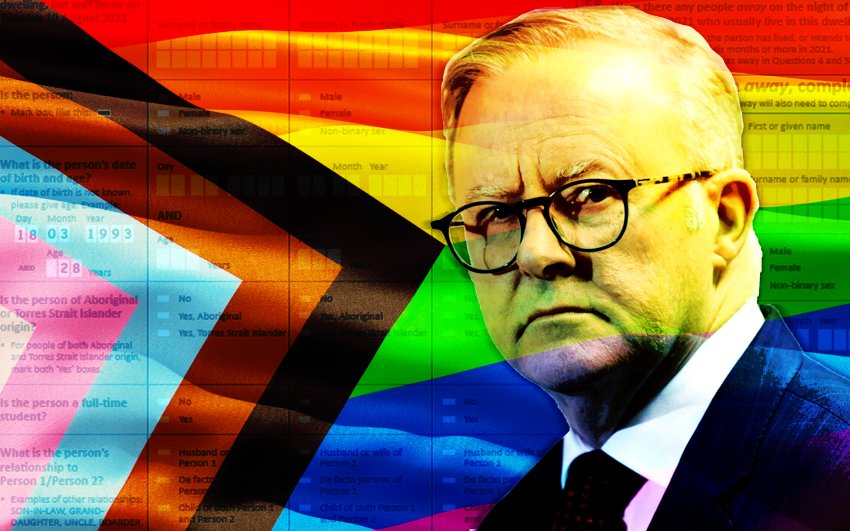
Prime Minister Anthony Albanese has backflipped on his decision to exclude new questions about gender and sexuality in the 2026 Census.
This follows a backlash from LGBTIQ advocacy groups across the country.
Albanese announced on August 25 that Labor had scrapped plans for the Australian Bureau of Statistics (ABS) to trial new questions that would identify transgender, sexually diverse or intersex people. This is despite Labor promising this in its 2023 federal platform.
Under “Gender equality and women’s rights”, the platform said: “Labor believes that LGBTIQ+ Australians should be counted as part of the national census. As part of the next census, Labor will commit to: a. include LGBTIQ+ Australians in the consultation and planning process for the 2026 Census; b. ensure that the 2026 Census gathers relevant data on LGBTIQ+ Australians; and c. discontinue the practice of randomly assigning non-binary people and intersex people as male or female.”
Deputy Prime Minister Richard Marles said on August 28 that the questions were removed to avoid a “divisive debate”. This was echoed by Treasurer Jim Chalmers, who said Labor was trying to avoid “the nastiness that sometimes accompanies … the census”.
“My fear, and one of the things that’s guided us here … we’ve seen the way these issues can be weaponised against members of our community and we don’t want to see that happen,” Chalmers told ABC Radio National.
Social services minister Amanda Rishworth said the proposed questions were “too complex” for people to understand. Albanese backed her excuse, claiming the ABS questions, which were two weeks from being trialled, “weren’t appropriate”.
LGBTIQ equality groups, health professionals and six Labor MPs expressed their disagreement with Albanese’s decision.
Gunnai, Gunditjmara and Djab Wurrung Independent Senator Lidia Thorpe called on Labor to take note of the Victorian Coroner’s findings on the suicides of five young trans women.
The coroner’s report, handed to Labor on August 29, said: “Robust data is needed as a matter of priority to inform health, wellbeing, and suicide prevention initiatives in the [transgender] community.”
Thorpe described Labor’s decision to exclude questions on gender identity and sex characteristics from the census as “appalling”.
Equality Australia (EA) CEO Anna Brown described the decision as “staggering”. EA, along with non-binary parent April Long, made a human rights complaint against the ABS following the last census’ omission of questions pertaining to LGBTIQ people.
The ABS then committed to creating an advisory committee to focus on LGBTIQ topics and questions for the 2026 census.
“It is staggering that after all that work … the federal government has made the call not to proceed with new topics,” Brown said. “Our communities will continue to feel invisible and demeaned.”
Almost 80 LGBTIQ organisations signed a joint statement expressing collective “dismay and frustration” at Labor’s decision.
Just.Equal Australia spokesperson Rodney Croome said Albanese must be uninvited from the Sydney Mardi Gras parade.
Alex Wallace, an organiser for Queer Liberation Boorloo, said the PM “has decided to once again throw the queer community under the bus”.
Albanese’s flip-flop on the census questions is another key LGBTIQ election promise scuttled: it has backed away from fixing the religious discrimination laws that allow religious institutions to discriminate against LGBTIQ people; and the equality bill remains in limbo.
Greens leader Adam Bandt accused Labor of making empty promises. “You cannot believe a single thing Labor takes to the election because it now has an asterisk next to it,” he told the National Press Club on August 28. “Every election policy from Labor will only be implemented if Peter Dutton agrees.”
Albanese had been pressured to announce that a single new question focusing on sexuality, not gender, will be included. But then on September 1, Chalmers announced Labor had “listened to the community” and a new topic about gender would be included.
The new “sexual orientation and gender” topic, they say, will gather statistics on sexuality and gender identity, with the ABS to determine the wording.
This new topic will not be mandatory and will only be asked of people over the age of 16.
However, a question relating to intersex people will not be included. Assistant treasury minister Andrew Leigh claimed that no “high quality data could be collected” because of the “technical complexity of the topic”.
Brown welcomed Labor’s “sensible, pragmatic and moral course of action”, saying that “vital data about some of the most vulnerable populations” would, for the first time, be collected.
She said the newly created LGBTIQ Expert Advisory Council should work with the ABS “on a new topic covering people with innate variations of sex characteristics for a future census”.
But many in the LGBTIQ community will not forget Labor’s treatment of some of the most vulnerable communities and their alleging that it is “too complex” to either engage with the topic or to receive reliable data from the community.